#proves how fundamentally good he is and always has been
Text
I am the first to point out that, of the two leads in P&P, Lizzy’s is the far deeper moral transformation and to say that Darcy’s character especially re: his flaws is wildly misunderstood and frequently painted out worse than he is out of fear of his particular kind of power. All of that said, I do love that Lizzy is just like “no, the way you treat me isn’t good enough and I will not simply accept it”
#and the fact that he agrees with her completely and does something about it#proves how fundamentally good he is and always has been#idk. I just love that she isn’t afraid of him#and that she DOESN’t ever sort of like make up a tragic story for him for his silence and reserve#she’s just like. what is that Man doing over there in the corner#if That Man liked me he would show it differently#that Man should treat people better in social situations#and like. she isn’t wholly wrong#she is wrong about a lot as regards him#but her mistakes (some part of them) is just common man refreshing and he sees the sense in them#and again. there is no fear#both Bingley and Georgianna are a little afraid of him#and Bingley needs to take responsibility for his own actions nonetheless#but he feels the force of the personality! and sometimes has trouble standing up to it!#Georgianna’s fear is much more awe/respect/little sister love#But I just#there is something about Lizzy where she’s just so unafraid of him#and so uninterested in being awed by him in a certain way#and it’s so good for him and his generous heart absolutely loves that#basically Darcy had just gotten used to being the coolest/smartest person in the room#and had grown complacent#(because he really isn’t fundamentally bad mannered. even before)#and there’s a lot of reasons all the stuff comes out of his mouth during the first proposal#and a lot of it is the expression of the internal war he’s been fighting#And tbh it’s both honest romantic and valid#and yet all of that said Lizzy is still like ‘and I have to hear you say this about my family why?’#and her explosive anger towards him is rooted in so much that ISN’t fair#and (again) the deeper moral transformation is hers I fully believe that#but that part of Lizzy that’s just like ‘I am too cool and interesting for you to be speaking to me like this’#‘I am just as cool and interesting as you and I am unafraid of you’ is so valid and so funny
16 notes
·
View notes
Text
Time travel AU where post canon Lan Qiren travels back in time to when Wei Wuxian is 4 and has just lost his parents. Lan Qiren may hate the man (now boy), but he still follows the rules strictly and will not kill. Instead, Lan Qiren finds a 4 year old Wei Wuxian cowering in an alley hiding from dogs. He protects the boy because the rules tell him that it is his duty to do so.
There is a spiteful part of him that wants to send this boy far away. However, he reconsiders when he thinks of how the Wei Wuxian in his previous life created Demonic Cultivation when left unattended. The best way to keep the boy in line, Lan Qiren figures, is to raise him himself as a ward. Keep your friends close but your enemies closer, they say.
So that is exactly what Lan Qiren does.
Wei Wuxian is brought back to the Cloud Recesses and raised as a ward alongside Lan Xichen and Lan Wangji. Lan Qiren would prefer otherwise, but he doesn't trust anyone else but himself to control Wei Wuxian.
As time goes by, Wei Wuxian proves to be the same and different to the one that Lan Qiren knew previously. He's energetic and mischievous, carefree, with a love for teasing others. Every bit as genius and inventive as Lan Qiren knew of the boy in his previous life. However, there was a strong sense of justice that he didn't notice the last time (or refused to see, but it would take years for him to admit to himself).
And Wei Wuxian thrives in a way that Lan Qiren didn't expect. He knew that Wei Wuxian was powerful and intelligent, yet he did not realize just how so. As much as the boy loved to tease and joke around, he could also be found in the Library Pavilion studying whatever random topic caught his interest. Talking everyone's ears off on what he learned or ways that certain things can be improved upon.
It infuriates Lan Qiren to no end because many times, Wei Wuxian is right. Many times, Wei Wuxian just needs guidance to find the right direction or a different perspective. Since Lan Qiren was raising him alongside his own nephews, the people that Wei Wuxian goes to the most are them: Lan Qiren, Lan Xichen, and Lan Wangji. The latter two always happy and excited to discuss the myriad topics, while the former confused as to the feelings he's having for the boy.
Lan Qiren's sister-in-law passes, and Wei Wuxian kneels next to Lan Wangji in the snow for hours silently in comfort. It's the first indication that the boy is secretly kind and compassionate (not so much if had he paid attention the last time and rid himself of clouded judgments). It's the event that causes the two boys to be inseparable. Of course Lan Qiren is worried but, he tells himself that he will not let them marry. He will not let Wei Wuxian turn into that evil man he ended up being.
Years keep going by, and Lan Qiren finds himself slowly warming up to Wei Wuxian. He's there for many important firsts (losing his teeth, golden core formation, getting his sword, etc). He will never admit that his heart squeezed when the boy accidentally calls him A-die without thinking because he's so excited about something he's learned.
Jiang Fengmian comes to the Cloud Recesses when he finds out that Weo Wuxian is there. Desperately, he tried to convince Lan Qiren to let the boy become a part of Yunmeng Jiang. But Lan Qiren is adamant in his refusal. The boy was raised there the last time and look at how he ended up! He doesn't know that this fundamentally changed Wei Wuxian's destiny. From a tragic hero given a second chance to a free boy allowed to be happy.
The Jiang sect leader mentions during this visit that Wei Wuxian owes Lan Qiren a life debt. It's something that hadn't crossed Lan Qiren's mind. Not really. He had been raising the boy selfishly to change a horrible future. Sure. However, it was against the rules and his own morals to demand a child pay reparations to be allowed to live. He has felt the same way when Lan Sizhui, his good perfect Lan Sizhui, had been adopted into the family. To Lan Qiren, it was unfathomable to demand payment from a child in such ways.
And anyway, Wei Wuxian's genius was already making itself known. If the boy invented even half of what he came up with in his previous life (Lan Qiren crossed his fingers for no Demonic Cultivation), then the Lan Sect would be paid in full from the proceeds.
Still, years continued to creep by, and Lan Qiren began to feel pride in Wei Wuxian. He followed the rules decently well, received his punishment with little protest, and had an insatiable thirst for knowledge. The boy could be seen at any given moment debating an array of topics with seniors, elders, and peers.
When Wei Wuxian started going on night hunts with Lan Xichen and Lan Wangji, the three became known as the Three Jades of Lan. Pride bloomed even more in Lan Qiren's heart. He had successfully turned Wei Wuxian into a good and polished man. What he didn't realize was that he gave structure to a boy who needed it and didn't make him feel guilty for existing.
The Wens came and tried to burn the Cloud Recesses down but didn't succeed. Between Lan Qiren, Wei Wuxian, Lan Xichen, and Lan Wangji, the wards were strengthened, and the books copied and protected. The Sunshot campaign took longer to fight because Wei Wuxian had learned long ago of the dangers to the mind and body that it caused. He had also learned that he shouldn't rip himself apart to help others. Lan Qiren had implored the boy to never try and had used the boy's love and adoration for Lan Xichen and especially Lan Wangji to convince him.
After the Sunshot campaign, Wei Wuxian comes to Lan Qiren about the innocent Wens cultivator and noncultivator alike. By this point, Lan Qiren can agree that innocent people should not die because of selfish greed and blind prejudice. There are years of trials completed by a multisect jury. The Wen sect survives but becomes a minor sect by the time the trials and reparations are completed. Under Wen Qionglin, they focus on medicine and archery.
Wen Qionglin swears brotherhood with Wei Wuxian. It doesn't surprise Lan Qiren in the least bit. Had it been a lifetime ago, it would've infuriated him yet with all these years and direct dealings with Wen Qionglin, he respects the boy. Admires the gentleness that hides a fierce strength and sense of justice. Especially admires Wen Qing, who Lan Xichen ends up falling for and marrying. Again, had it been a lifetime ago, he would've lost his mind. Now, Lan Qiren can see Wen Qing for her genius, her directness, strictness, and her advancements in medicine.
After Lan Xichen and Wen Qing marry, Lan Wangji and Wei Wuxian approach Lan Qiren and Lan Xichen to ask about marriage. There is no denying them at this point because he knows that the Wei Wuxian of his previous life is nothing like this current Wei Wuxian (he is but Lan Qiren has no one to admit it to). And anyway, he knows the two will simply elope if denied.
It's several years later, when Lan Qiren finally sits Wei Wuxian, Lan Wangji, and Lan Xichen down and tells them a story from a lifetime ago in a forgotten timeliness that may exist somewhere out there if you believe in multiple universes (not surprisingly Wei Wuxian does). They patiently listen as Lan Qiren details everything. There is silence for a long, unbearable moment when he's finished speaking.
Eventually, it's broken by a hug from Wei Wuxian, "Thank you, A-die, for giving me another chance in this life."
"I should be the one thanking you, A-Ying," Lan Qiren says softly, himself grateful for his second life.
#mdzs#the untamed#Lan Qiren#Wei Wuxian#Wei Ying#mdzs fic#the untamed fic#Lan Wangji#Lan Zhan#Wangxian#Lan Xichen#me writing a fic in 2024?!#holy shit more likely than you think#this is good uncle Lan Qiren though he probably selfishly wants to be bad uncle#he just adopted a child amd thought he wouldnt grow to love the boy as his own son#what a moron
346 notes
·
View notes
Text
how interesting that when Rhaenyra looks at a maimed boy whose eye was gouged out by her own son and says "he must be sharply questioned" (aka tortured) for repeating things about her that she knows are 100% true, and when Alicent is horrified that an insult to Rhaenyra (which is, again, 100% true) is considered more important than her son literally being maimed and whose broken skin is currently being stitched up as they speak, Viserys chooses to support Rhaenyra. He walks up to his bleeding brutalized son and orders him to tell him where he heard such lies. He offers him no comfort or reassurance as a father, just an order. "Your King demands an answer."
(and frankly, he expected them to say Alicent. Look at the way he looked at her. He was almost expectant. He wanted her to be condemned)
and both of them prove completely unwilling to obey him. they look at this piece of deadbeat shit right in the eye and say: "We know, Father. Everyone knows. Just look at them."
And now that the accusation has turned back to Rhaenyra, does Viserys choose to listen and do something about it? does he? no, lol.
Instead he declares: "This terrible infighting must cease. We are family." How convenient. how fucking convenient. when Rhaenyra wanted justice (aka the further torture of a maimed kid for telling the truth) Viserys is fully willing to indulge her. He wasn't Aemond's family when he questioned him: he said it himself, tell me by the order of your King. But when his children refuse to listen to him, when the issue turns back to Rhaenyra? We're all family, let's reconcile and put this behind us :)
and that is when Alicent asks Viserys for justice of her own.
just look at Alicent's tone. Rhaenyra was the one who flat-out demanded that Aemond be questioned. Alicent isn't demanding anything, she is pleading. You think she cares about taking Luke's eye? (just minutes later, it's Rhaenyra she goes after. and when Larys asks her flat out if she wants him to do the deed for her, she tells him that it won't be necessary). Look at what Alicent says after this: "He is your son, Viserys. Your blood." This fucking asshole has raped her and abused her, and she is begging him to at least care about his children with her. And he does not.
He displays, for the whole court to see, that he does not give a fuck about his wife and their children. His young son has been horrifically maimed, but shielding and coddling his adult daughter from completely justified "accusations" is what he is most concerned about.
"This matter is finished," Viserys says. And right after? "Anyone whose tongue dares question the birth of Princess Rhaenyra's sons should have it removed." So essentially: the matter is over, everyone should make goodwill, but his precious daughter is always right and will always be his first priority. partly to soothe his own guilt over murdering his previous wife, and partly because Rhaenyra is a Targaryen which, to him, will always make her more worthy than Alicent.
and so it is his wife and other children - including the one who is bleeding in the same damn room - who pay the price for that
And thus, all of Alicent's well-founded fears about the life of her children and herself if Rhaenyra takes the throne are completely solidified. She and Rhaenyra do not share equal culpability for this conflict in the show, because Rhaenyra begins by fighting for power and Alicent begins by fighting for survival. The blame is fundamentally unequal.
you CANNOT tell me that Alicent was unjustified in how she reacted. you CANNOT tell me that she wasn't 100% right in grabbing that knife and going right to Rhaenyra (to rhaenyra! not to luke), demanding justice.
"and now you take my son's eye, and to even that you feel entitled" She is right. She is absolutely right. (She has no idea how right she is, actually, because that entitlement will lead directly to Rhaenyra's downfall someday)
Alicent Hightower finally snapped. GOOD FOR HER.
#hotd#house of the dragon#alicent hightower#aemond targaryen#anti rhaenyra targaryen#anti viserys i targaryen#queue#hotd spoilers#anti rhaenyra#anti viserys#not really anti rhaenyra but just in case#mine
3K notes
·
View notes
Text
There is no gun to his head.
I don't know where that notion came from or why so many people are suddenly convinced it is true, but I rewatched the last episode and especially the final fifteen over and over again and it's not real.
So. Let's have a look at the facts, and I mean facts, as in what we see on screen and what we can generally all agree on happens—no metas, no headcanons, just pure canon.
Aziraphale and Crowley just witnessed Gabriel and Beez go off together. They are free, there are no consequences for them, they left and have no interest in returning.
This tells them two things: Any threats from hell or heaven regarding their relationship are void under the current conditions. Hell is understaffed and dealing with its own problems, and heaven is a mess in a different but equally disabling way. The second thing, or rather the consequences of the first, is that they can do the same.
Let that sink in because so many people seem to completely forget about what that scene signifies outside of being a "relationship mirror". There are no consequences when a demon and an angel go off together. In the end, they weren't stopped, everyone kinda sighed and went well, we have our own problems, so they might as well leave.
Now, when the Metatron talks to Aziraphale, that scene is fresh in his mind, it literally just happened. The threat is gone, he does not want to return to heaven in that moment because he is processing what it means for the two of them.
Then, the Metatron offers him the jackpot: Aziraphale gets to fix heaven—make a difference, as he likes to put it—and have Crowley back as an angel. Aziraphale still thinks heaven is fundamentally good and thus the best place to be; angels, the two of them, how great! All of his moral problems have been solved, and, let me stress this over and over, there is no threat.
The Metatron LITERALLY just proved to him that he won't punish angel/demon relationships—he stopped Michael from punishing them. In Aziraphale's eyes, he is the knight in shining armour, threats wouldn't even be necessary.
Additionally, and I have repeated this so many times it has become tedious, Aziraphale does not know about the second coming. He doesn't. The Metatron tells him in front of the elevator, not a second earlier.
To summarize
he has tangible proof that angel/demon relations won't be punished
the Metatron has proven himself to be an ally and trustworthy
there is no dawning apocalypse
Crowley can come back to heaven with him
In conclusion, every single one of Aziraphale's problems disappears. Threats—threats over WHAT?
Do you really think the Metatron would immediately contradict himself and destroy any tentative trust Aziraphale has? Do you think he would jeopardize the blind fearlessness he develops as soon as he mentions the Crowley part of the deal?
Everyone always calls him an evil mastermind, just to turn around and paint him as the dumbest figure imaginable. He knows what he is doing.
When Aziraphale tells Crowley about the decision he has made for them, his voice is genuinely soft. It's real joy, no hidden messages, no nothing. Have you recently re-listened to it? Because I have.
"He said I could appoint you to be an angel."
That happiness and excitement is real, it just is. I rewatched it over and over and I tried to see any hidden meanings, I really did, but he's simply happy. That's all.
Everyone is completely free to have their own theories, you can disagree with my meta thoughts all you want, that's what fandom is for!
But I am so bloody tired of getting "well, actually there was a gun to his head" on every. single. post. that I make about the final fifteen. There was no gun.
You can put one into the Metatron's hands all you like, but it is not canon. It just isn't.
#alex talks good omens#good omens#ineffable husbands#crowley#aziraphale#good omens season 2#go2#aziracrow#crowley x aziraphale#ineffable divorce#the final fifteen#good omens meta#just waiting to be thrown to the wolves for this#but like genuinely stop adding that to my posts i am so tired of having to repeat myself over and over and over again
223 notes
·
View notes
Text
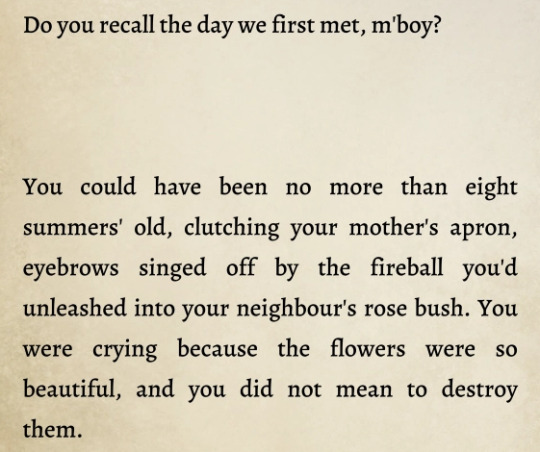
CW for grooming
so uh. this is part of a letter from Elminster to Gale in the epilogue (God ending for Gale, unromanced).
If this isn't irrefutable proof that Mystra groomed Gale in every sense of the word, I will eat my wizard hat.
There really isn't any reasonable explanation I can think of for Elminster visiting an eight year old Gale other than Mystra sending him. Elminster is busy and his time is precious.
Gale was eight when Mystra decided it was appropriate to show her interest in him by sending her most famous chosen.
He was so young, so impressionable. Knowing the goddess of the weave, magic, the thing he was best at and most passionate about, thought he was special? Fuck.
I always thought it strange how people denied this - we may not have had hard evidence but the way Gale strings together "child prodigy", "mentor", "muse" and "lover" in the same sentence has always been extremely damning.
Can we accept it now? Please? No more discourse on how Gale is just a Hubris Machine who crossed Mystra's boundaries because he's fundamentally arrogant? Accept that he was groomed to be desperate to feel special, to adore Mystra, to do anything to prove his devotion?
I know that won't happen but a man can dream.
Hope y'all had good parties. Ain't no party like a Withers party.
#bg3#bg3 spoilers#bg3 epilogue#gale dekarios#gale of waterdeep#baldur’s gate 3#this epilogue was from my first playthrough and I had no idea how firm you had to be with Gale to stop him persuing Godhood#In the epilogue I will hopefully reach this weekend it will be with him as my partner#and i've successfully talked him down from it lmao#but yeah jesus fuck can people just ACCEPT he was groomed#cw grooming#tw grooming#grooming
367 notes
·
View notes
Note
All of your Bruce takes are so real and so true. It must break your back having to carry the weight of being the most correct batman account on this website. 🙏🏻 I love your thoughts about Bruce and Dick in particular and I was wondering if you had any thoughts about Bruce and Damian? Something about them is just… oh boy.
that’s very sweet but untrue, anon 🫰
i love damian and bruce's relationship, but it's hard to talk about without mentioning two other crucial people - talia and dick. for my own sanity i only accept damian's conception as a consensual act, so in this context talia is a fundamentally well-meaning person who attempted to protect her son from a violent life, and hid his existance from bruce until she felt he could be safe. damian loves and respects his mother. this is important.
dick, on the other hand, is really the foundation for their relationship. bruce spent like two weeks with this kid before he went on his timestream roadtrip and left everything behind for dick to juggle. contrary to popular opinion, i think it's a real disservice to act like dick taught damian to "be a good person" or like basic etiquette - a more realistic interpretation would be that dick taught damian that he didn't have to prove himself to be worth something.
the robin mantle from the time it was taken from dick has always been about proving yourself to bruce, to justify your role as his partner. always unfairly, mind (think how tim is treated vs. steph, for example), but damian is the first robin's robin. dick isn't a wayne, he's a grayson. there's an interesting point of comparison being that dick is the only robin who had a clear trajectory for his life prior to his parents dying - he was a core member of the worlds greatest acrobatic troupe - but he then left that path to become something else. damian is destined for the bat, but becomes robin instead, serving beside someone who achieved greatness by his own skill and kindness. damian has been told about his father, and here he is with someone who knows bruce better than anyone but also understands what robin means, better than anyone. i cannot emphasise how important i think dick being damian's first batman is for their own development. it's so so crucial to combat damian's perspective on family and blood. it's so important that he has that foundational knowledge of what robin means.
by the time bruce returns, damian has made tangible human connections in gotham. he's not the prickly, reactive kid that bruce first met. he's allowed himself to trust that the people around him have his best interests in mind. he knows that he isn't cared for because he's bruce's son - he's cared for because he's worth loving. his siblings aren't competition for affection or honour. he no longer sees bruce as an omnipotent force, and rather as a man he could learn to love. i think seeing bruce through both talia and dick's persepectives really helps with that.
bruce i think is confronted by the fact that for the first time in his life he can't try and hide behind the "im not really xyz's father" excuse. not that his adopted kids aren't his kids, obviously, but i do think he sometimes tries to lean on that as a crutch so he doesn't get attached (way too late for that lol). he loves damian, and there's a lot of fear about damian reflecting his worst habits, his most self-destructive behaviours back at him. maybe there's some fear about damian's history of killing, and how close bruce himself always feels to that edge. maybe there's misery about missing one of his kids growing up, again, like he's always a second too late to the important moments. bruce and damian are so similar, but this is bruce's second chance to be there. he is thomas wayne, emerging from the alley alive. do u think damian looks like his grandparents?
#sorry this mostly ended up being about dick again oops#damian wayne#bruce wayne#dick grayson#batman#robin#dc comics#the ask and the answer#also i have spondylitis so my back would literally give out
169 notes
·
View notes
Text
In case you found this post before the Start Post, I’m going through and looking at the matching wounds for every LimL team! How they were hurt in past seasons and how this season addressed that harm
Starting off strong with TIES! The name calls back to team BEST, however I wanna point out the differences between the two. First of all and most notably, Bdubs has been swapped for Impulse- and that greatly changes the group! They both fall into the habit of being a yes-man, but where Bdubs tends to be very ambitious with his support, Impulse is a lot more cooperative in a group setting. With this, TIES is able to set very clear, achievable goals and accomplish them without all the bells and whistles. We need a tower? Tango’s got it! It’s crooked, but he’s got it. Skynet? It looks scuffed but they’ve got it!!!
NOT ONLY THAT but TIES and BEST have a different fundamental worldview! TIES values the group above all else. They need to be there for each other, to stand by one another and to uplift the group no matter what. They’re bound by their Tie to each other (ha). But BEST? BEST valued their IMAGE above all else. They’re the good guys, they needed to set an example for the server. It didn’t matter what was going on in their team, they needed to project a strong image, they needed to be the Best (ha 2).
And that’s One piece of the matching wound in TIES: they all come from dysfunctional alliances
This is especially true of Tango! Tango, in 3L and LL, was cast to the side in every alliance he tried to join. Not only that, but in the alliances he Was a part of, he always ended up getting physically harmed. In 3L it was the firing squad, and in LL it was when Bdubs turned red the first time and then when Bdubs was the boogeyman. Not only that, but in both seasons he was only valued for what he could physically provide.
In 3L it was partially beef/leather, but mostly information. The only alliances that stuck were the ones that wanted information from him as a double agent. The second he picked a side, the other went after him. This is despite the fact that he Did have a day1 alliance in the form of the village people, but that alliance barely made it to the fourth episode, with Etho and Impulse sharing the wool castle and Tango being left to fend for himself. Then in LL, BEST had a tendency to use him as a Life dispenser, if someone got hurt then Tango’s there. Outside of that, he really wasn’t valued- something he even confronts them about throughout the season. It’s to the point that Tango’s dying action is to trap BEST, to destroy the place that caused him this much harm (granted his death was unintentional)
Impulse was on the other side of things- yes he did tend to be overlooked in many of his alliances, but really his downfall in those alliances came from him overlooking others. Let me explain- in 3L he tried to play all sides and subsequently sabotaged every single alliance he was a part of. Throughout all of it he kept Saying his heart belonged to the Crastle, but his actions continued proving otherwise. He overlooked their concerns because he thought he could prove himself, but only turned them against him. And of course they turned on him! Of course Bdubs specifically turned!! Impulse’s loyalties had been dubious at best and it was hard to know where he stood despite what he said
Then in LL he tries to be a part of a functional team, except the Southlands was on constant rocky ground, especially when people started dropping down to Red. Impulse’s immediate reaction wasn’t to try and bring them back, it was to treat them as an unavoidable threat. So stealing the wither skull from Joel and Grian’s bunker and trying to plan for when Mumbo eventually came back to trap their towers. He’s not the only person to do this both in the southlands and in LL general, but to me it feels like a contradiction. If you want the team to stay together, keep them together! Don’t turn your back the second someone becomes a danger to themself and others
Admittedly, I haven’t seen much of Etho’s side of things so sorry if his is off! But for Etho, he has a tendency to try and act alone. Yes his group has a plan, but he always has a side plan like the enderporter in 3L. What’s unique about this is it’s usually something that only directly affects him should it go wrong, but if it goes well then the entire group benefits. He shields other people from getting hurt at the expense of himself- except they don’t see it so they don’t know to step in. In fact the only person who knew to step in was Bdubs, as seen throughout LL but ESPECIALLY with the Wither fight. Afterwards he even remarks “Etho couldn’t do it without me, I Gave Him The Courage”
However, the opposite is also true. When he acts alone, consequences don’t follow him as closely as they probably should. In 3L it meant when he moved to the swamp he accidentally split up the village group- leaving Impulse and Tango stranded and actually starting them on their arcs. Yes they followed him out there, but that was basically an Invisible alliance, never really getting called upon outside of what Dogwarts needed. It also meant when he started conflict between Dogwarts and the Crastle with the tnt missile attempts, Joel ends up taking the brunt of that
Etho inadvertently hides himself and I think that’s very fascinating
But overall, something Tango, Impulse, and Etho all have in common is that their issues all started in 3L, continued into LL, and were addressed in DL.
Tango finally got an ally who loved and cared for him through virtue of being himself. Impulse was not only Seen in his alliance, but he was paired with someone who he couldn’t ignore or avoid. Etho’s consequences were linked to his soulmate, meaning he couldn’t hide himself no matter what he did. They were encouraged to be there for their partner and took that in stride
But again, their issues were confronted. Skizz’s issues weren’t
For Skizz, he has a habit of putting his team before himself. In 3L that meant following Ren to a T, being the exact soldier Ren needed him to be and doing everything in his power to help Dogwarts succeed. It meant keeping his cool when Ren called for a retreat but Skizz wanted to keep fighting and it meant charging headfirst into the Crastle when it was revealed they had the Red Winter axe. Skizz gave his whole life to Dogwarts! And to quote bojack horseman real quick- I’m not talking about his Death, I’m talking about his Life, he gave his whole Life
In LL putting his team first meant trying to act as leader to this very dysfunctional group. Skizz was the main one coming up with plans, he’s the one that made the meeting room, their shields, everything! But really, he wasn’t regarded as their leader, Bdubs was. Bdubs, who is headstrong and overly ambitious with his plans, Bdubs who was quick to criticize the group’s shortcomings and Bdubs who had a switch like a hair trigger if he turned Red or became the boogeyman, who Split The Fort In Two when he was exiled.
Skizz did everything for BEST and how did they repay him? By running, by leaving him behind when a tnt cannon failed. What Skizz learned there is when you do Everything for other people, you end up with nothing. You end up dead in the enemy’s castle, you end up cornered by the sharp ends of three crossbows. And I think this is what he’s responding to at the end of LL- mimicking Mumbo’s reckless attacks and even going back to get revenge on Ren for his boogeyman trap earlier in the season (said trap Skizz had previously complimented and said he wasn’t even mad about). It’s giving “no more Mr Nice Guy” and I’m here for it. He wouldn’t be the faceless defender of his team, he would be the cause of their demise- being there for Tango AND Bdubs’s deaths while spectating as a ghost
But again, Skizz wasn’t in DL, he didn’t have an alliance where he could recover. He was never given the space to learn to give comfortably, and to learn to receive support from his team.
And with this, I think it’s Fascinating that LimL started off in the way that it did
Skizz was targeted by the boogeymen not once, but TWICE in the very first episode. The immediate response by the server was to form a protection squad around him. It was to Stand By Him. This contradicts the mindset he died with in LL- that the world will take until there’s nothing left of you to give. And I think that’s action was ESSENTIAL to him being able to function as the leader of TIES
In case it wasn’t clear, the three matching wounds for TIES is 1) they come from dysfunctional alliances, 2) they struggle to function as an individual in a group setting, and 3) they habitually give more than they take
So TIES has a pretty strong understanding of one another with their similarities, BUT they also have another thing in common, a shaky past with Bdubs. I touched on this in all of their sections, but all four of them had issues with Bdubs in previous seasons. Tango was singled out by him several times despite sharing an alliance. Impulse was permakilled by him Twice despite being in the same group. Skizz clashed with him because of his headstrong behavior and Etho sidelined himself because of that same behavior.
I don’t even think they realized this at the start, ESPECIALLY not Etho- who had never been directly wronged by Bdubs. But Impulse trying to pry an apology out of him via gifting him a clock definitely conveyed this- why? Bdubs, in fact, did not apologize. He didn’t even see the problem. This is familiar to Impulse, its familiar to Tango, and it’s especially familiar to Skizz, having just been boogey-killed by him
So really it’s no surprise that they ended up having conflicts with the Clockers!
Start Post | The Clockers
#trafficblr#limited life#team TIES#tangotek#impulsesv#ethoslab#skizzleman#not including the Bdubs tag even though he’s very much present for this one
80 notes
·
View notes
Text
Saying that what fans (and post-flashpoint) make Jason is what Helena already is always gets one of two reactions: I hate Jason and this is true, I love Jason and this is completely wrong. Everyone's losing with that btw.
Helena and Jason are fundamentally different enough that it can't be exactly true. Helena and Jason's backstories don't have much in common either. Helena's involved betrayal, schemes and fights for power. Jason's was a product of Park Row being continually failed by Gotham. Jason also has a history with the Bats specifically, as the second Robin and a son of the family, that Helena doesn't. There is an appeal in that that's not transferrable; Jason's been a Bat and has had his own various roles since his he was created pre-crisis, not just since his resurrection or since he got a softer role post-flashpoint. He doesn't get to just not be a bat character.
In going "fanon Jason is exactly like Helena" you're also ignoring her time on the JLA and BOP, because remember that fanon thinks Jason sits around staring at his wall angrily until his family tell him to stop being a brainless killer OR runs around half-assing missions with his brothers friends because he has none of his own. It's honestly a disservice to her to pretend that brand of fanon Jason could ever be her.
However, Helena is the one who fought to be trusted by the Bats and compromised on killing because of them (whether that be due to the aforementioned struggle to fit in with them, or, at low points, because they know her identity). Jason did not due this pre-flashpoint, and even those abandoned attempts in Countdown didn't begin with the main timeline's version of Bruce. Pre-flashpoint Jason was not asking for anyone's trust or for a seat at the table. That's not even to say that any interpretation of Jason that has him reconciling with the Bats if a rip-off of Helena, it's just that Jason put himself on the outskirts of the family because he has personal issues with them. It's not just them making that decision. The role that Jason now occupies is very much the one that Helena had.
I'm not going to sit here talking about all the similarities and differences, or how they got tangled along the way. I just want to say that people who act like Jason was dealt a good hand by being given Helena's characterization by fanon and post-flashpoint are never going to be able to prove their point because you're focusing on the wrong thing (something that isn't even true). People who refuse to accept that the Jason they're talking about is a whole different character are going to miss out on any of the many interpretations of Jason that aren't just knock-off Helena's. And they're all pissing each other off in the process.
#it's just. you are biting at each other about something you will never agree on because you're approaching the conversation with goals that#go beyond the characters. you simply dislike a character too much or like a version of another too much to see what the other's saying#i don't think i could make it clearer: i'm not disagreeing that so much of jason in batfamily fanon is just helena. before anyone jumps me#helena and jason are more than just the black sheeps of the batfamily actually. i understand why arguments fall back on things like that#when youre frustrated and trying to prove a point thats what happens. but it ends in helena getting reduced to things that dont define her
55 notes
·
View notes
Note
for your recent ask on how to build relationships in movies where you used willabeth as an example i was just thinking of them as i read ur post lmao! what do u think are some underrated aspects of their relationship in the films ? and if you had to pick a favorite film of the potc trilogy based on just willabeth, which would you pick?
Oh, yay! A Willabeth ask!
AWE automatically wins on "At Wit's End" (aka "Will and Elizabeth's love theme") alone. That is the soundtrack to a cosmic, epic, transcendental, soul-moving, earth-shattering love story, that is the epitome of a romantic composition, it is everything. Like just listen.
But I mean, the scenes that they have in this movie?
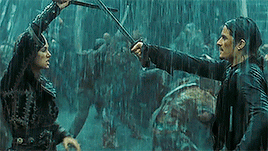



I'm not sure that there's anything that shippers find underrated about them, it would just be in response to Sparrabeth shippers or people who are anti-Willabeth, which I just don't find merits a response but something I do quite enjoy about the Willabeth love story is the role Jack plays in it and how his respective bonds with Will and Elizabeth actually reinforce that love story:
Like, Jack helps Will come to terms with his parentage and history
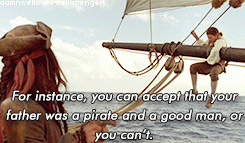
and therefore who he is and Will, in turn, saves Jack from the gallows.
Elizabeth has faith in Jack, tells him he’s a good man, helps him see the morality of situations
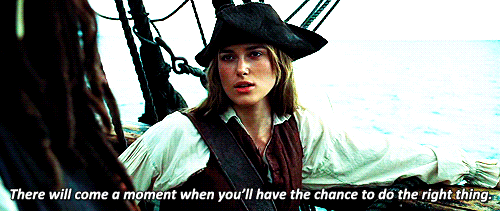
and Jack does prove her right in Dead Man’s Chest by coming back to help the crew but I think the most significant way he proves her right is by going against a desire he wanted for all of At World’s End so he can do right by Will (and it actually goes further than his desire throughout At World’s End but to a fundamental passion like he sold his soul to Davy Jones to get the Pearl, that’s how much he loves the sea)

and then you had Jack speaking to Elizabeth’s desire for freedom
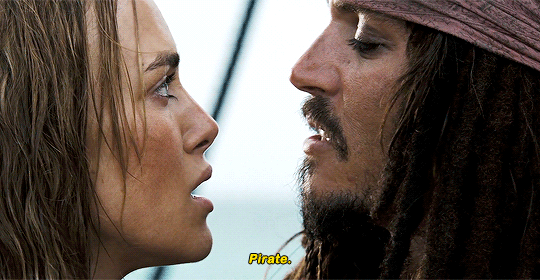
and encourages her obtainment of that freedom, of that agency, of that power

which ultimately leads back to her choosing to love and be with Will
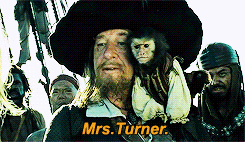
which, despite what antis say, isn't a regression. The trilogy begins with seeing her discomfort in "polite society" and feeling pressured into doing what's expected i.e. an engagement to Norrington
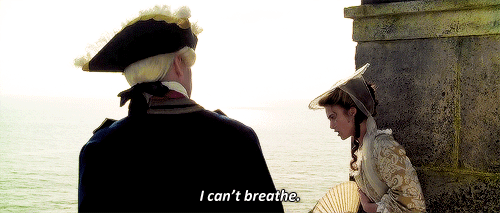
which includes hiding her fascination with pirates as well as her feelings for Will
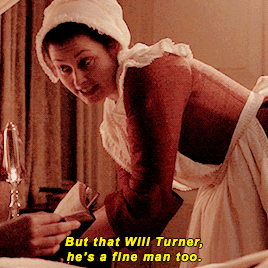

the two things are interconnected. In fact, when we see her being chastised for not behaving the way she should, it's when she's too intimate with Will
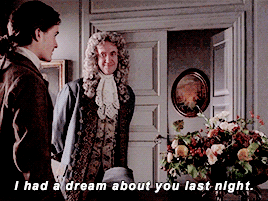

Her interest in pirates is signified with her keeping Will's medallion
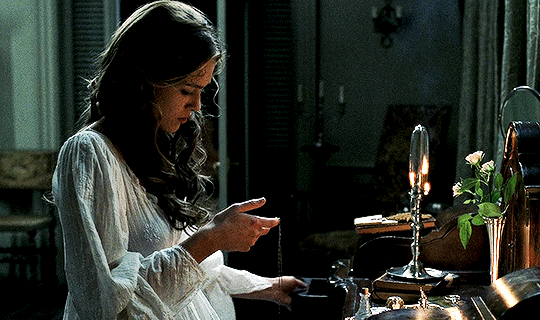
her choosing Will is also her choosing her own freedom
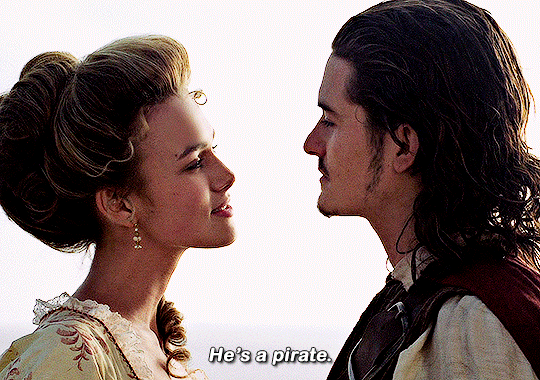
Will even teaches her how to fight
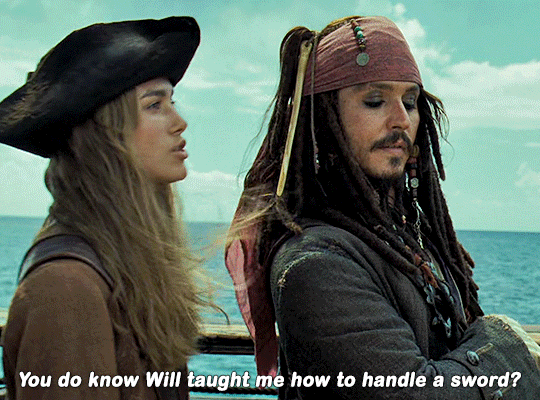
and throughout the trilogy, it's them discovering more facets of themselves i.e. Will reunites with his father, Elizabeth actually gets to be a pirate but what even got them on those journeys was trying to find/help the other so they can be together
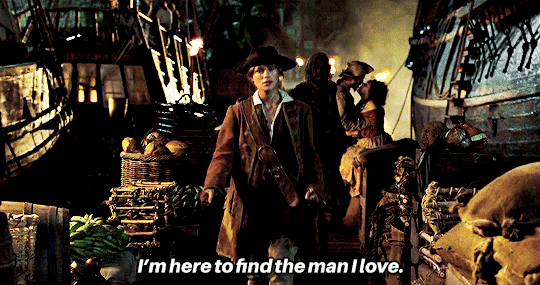

and those layers just bring them back together stronger. This has always been the point
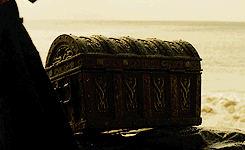
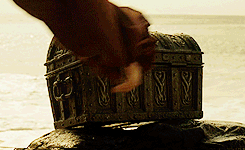


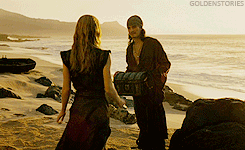

This also isn't exactly underrated but I find when I go into the tag, there's a lot of emphasis on what Will does for Elizabeth, how he supports her, how in love with her he is, how devoted to her he is and I completely understand why but also Elizabeth's devotion to Will deserves a spotlight as well.
Going to fight undead pirates alone to save Will
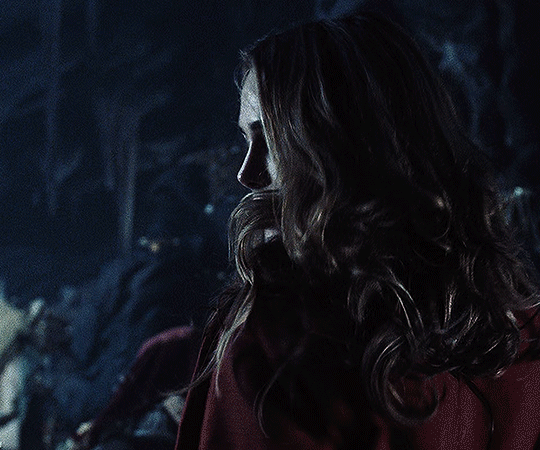
Being both surprised and upset at Will even considering that she could be in love with Jack
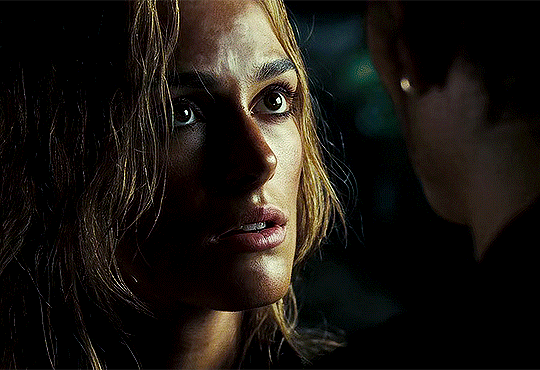
Giving away the entire plan because she couldn't feign disinterest when Sao Feng acted as though he'd stab Will

Having to literally be carried away by Jack when Will was stabbed

Even the smaller, in between things like Will shouting at Elizabeth to shoot at the barrels of rum but her refusing because he was still caught in the net.
I just love them so much.
50 notes
·
View notes
Note
🔥 Aleksander's mommy issues and if that plays a role in his relationships
I will say until I die that aleksander's relationships with others are defined by his relationship with immortality and thus with his mother - who not only taught him everything about it, but who has also been the only consistent presence in his life for over four hundred years. this is the woman that developed an emotionally codependent and incestuous relationship with him as well as groomed him into the type of man she would wish to have a partnership with, which further defines the ways he views himself, the world, other people, and his connections to them.
all of this correlates to his many relationships, but especially his romantic one with alina. he mirrors his traumas with his mother and therefore with eternity in his dynamic with her. he is simultaneously the perpetrator and the victim. where he spent hundreds of years forgiving his mother for her abuse of him because the alternative is eternal loneliness, he expects of alina the same level of forgiveness for his actions based on that same latent despair - because he was taught at a fundamental age that a dichotomy exists in the universe, and the only way to find anything good at all - safety or happiness or connection - is to center all needs around the threat of inevitable punishment. not punishment in any physical sense, but punishment at a transcendental level.
the reason baghra did this was to groom him. the reason any parent does this (and it is especially prevalent with religion and cults) is to control their children and guide them toward the ideal path (which is always the path they themselves are on).
like most abusive relationships, baghra relies on cult tactics to develop a dynamic with her son that erodes all boundaries and erases any attempt at creating them further down the line - effectively taking ownership of his personhood and growth. she redefines his emotional associations to link them all to herself, and she even takes possession of his body in a variety of ways, until she has molded the perfect partner. one who shares all of her values and so will never leave her side - and who is entirely and completely isolated through both a lack of consistently stable connections and the lack of ability to create them.
baghra has always, after all, had her control threatened most by two things when it comes to her son: his idealism - which drives his moral compass away from her - and his desire for other connections. which means that to truly have him as a partner, she must take control of these narratives herself. so, she must destroy his ability to connect, and she must mold his morals to fit alongside her own. meaning constant and consistent contact with him and every part of his life.
similarly, we see even this reflected in aleksander's dynamic with alina. aleksander attempts to relate to her in the only way he knows how: by exerting control and by guiding her down the path he is on - by claiming to know what is best for her. in the exact same way baghra has continually tried to repossess him throughout the years by leading him down the 'best path for him' - one that she defines as redemption through inaction. one that she knows could allow her to control him again through reestablishing his existential relationship with punishment, loss, loneliness, and fear.
she seeks to do this because she needs him walking beside her again, easily pliable. because while time has furthered him from her, she is at least still in his life holding some of the reins, but nothing has threatened her grasp on her son as much as another prospective partner. one that won't harm him the way she has and one that could easily reveal exactly how much of himself he has lost to his mother in her claims about living eternally. one that could prove to be a real, stable relationship for him - unraveling all of the threads she so carefully wound.
like baghra did with him, aleksander fosters a codependent relationship with alina, because he was taught that such a relationship is the only way to survive immortality (and that this is how relationships work at all). he desires alina to be his immortal companion, in the same way his mother desired him, because he longs - probably without realizing - for a relationship that is not defined by constant abuse. but he has none of the resources to break free of the cycle of abuse, because he cannot even conceptualize that the things baghra taught him are abusive.
everything baghra taught him, he repeats to alina. every lesson about immortality, he repeats to alina. the possessiveness which defines his relationship with his mother - the ways she controls his interactions with others and isolates him completely - this he mirrors also with alina. because the only framework he possesses for a long-lasting connection is his relationship with his mother, and he is so starved for real connection that he craves it.
he craves it because baghra made him crave it. because she starved him of affection and made him reliant upon her as his sole provider for it. then she destroyed any other source he might find. she did this because she wanted to ensure he would always come back to her and forgive her. additionally, they are in the position of being entirely unique, which only further provides another tool for abuse. it is so so easy to neatly isolate someone when they are already othered completely and have no reliable means of long-term connection but you. it is so so easy to starve someone and lead them to believe they are gorging themselves when there is no other source of sustenance.
but then comes alina. who is also immortal. and who is quite capable of not only walking down aleksander's path, but having aleksander walk down hers. and alina will give aleksander the sustenance he needs. alina will give a long-lasting relationship with real happiness and affection and touch and love. alina will make him realize that the ways he tries to fulfill his cravings - the ways baghra taught him - are wrong.
which brings the situation to the plot.
alina's moral conflict is falsely dichotomized into two things:
a) kill the 'monster' and believe the true social issues that caused it can be solved through inaction.
or b) give in to the latent 'evil' that comes with being grisha, reveling in power, greed, and selfishness.
baghra as the author's mouthpiece supports the former, which means alina's 'enlightenment' must eventually follow this path - for the true moral message to be conveyed. and this path leads her away from the darkling. thus, it is inevitable within such a narrative that she would have to do so.
however, contextually, baghra's actions when putting alina on this path are those of an abuser losing control of their victim. while she operates within a narrative role, she acts in a way that is easily identifiable. the very specific way in which baghra confronts aleksander's relationships with others in both the books and the show (especially his relationship with alina) is that of someone who wishes to remove outside influences from the perfectly tailored environment of their victim. if alina begins to trust aleksander and start a relationship with him, then this environment will be disrupted - possibly destroyed - and he will be removed from baghra's influence forever. baghra, as an eternally lonely person, cannot let this happen.
but she has a new way of living, now. one that her son rejects, because he is finally trying to become his own person and create his own path. so, she molds alina into exactly what she is and ties alina to her completely, effectively ruining her son's chances for any connection outside of her ever again. not only that, but she severs any future attempts at connection between them by taking control of the narrative about aleksander. meaning alina will defer to baghra about him, about morals, about what paths to walk and what actions to take. she will defer to her about anything that leads in aleksander's direction, because she must 1) do so for narrative purposes (and baghra is first and foremost the narrative compass) and 2) reject all associations with his character completely.
so aleksander is now trapped in an abusive cycle with both women, and the options are either alina, who is not only his abuser’s mouthpiece, but someone who has been cut off from any attempt at a connection with him completely. or his mother, who is in many ways relying on alina's treatment of him to drive him back into her arms.
aleksander, who cannot conceivably understand why he longs for another partner, must focus on alina. but as someone who was brutally stripped of any ability to connect healthily, he can only communicate with her one way - through possession, control, fear, and manipulation. and because she now erects the same barriers baghra does and walks the same path as her- well. the pattern of abuse continues.
so yeah. I think he mimics his relationship with baghra in his other relationships. he attempts to connect in the only ways he knows how, and when he tries to move outside of the box and connect in his own way, baghra intervenes. he is a centuries old abuse victim that will literally never gain the resources or outside connections required to develop healthy relationships. and sab is lauded as a narrative on the side of abuse survivors. lmfao.
send me a 🔥 for an unpopular opinion (x)
#shadow and bone#grishaverse#sab#aleksander morozova#baghra morozova#the darkling#alina starkov#darklina#baghra morozova critical#anti baghra morozova#sab critical#leigh bardugo critical#sab meta#darkling#myramblings#asks and answers#eyyy ty for the ask nonny!#anon#ask games#abuse mention tw#grooming mention tw
192 notes
·
View notes
Text
The utter tragedy that is Gwen Stacy.
Like all spider people, she has to figure it out by herself. An endless slew of villains and only one teenage girl against them. An endless slew of villains and one of them turns out to be her best friend.
Peter Parker was bullied until he couldn't take it any more, and decided to fight back. She must not have noticed him cracking, breaking. He knew her secret the entire time, was there for her the entire time, and she didn't even realize his true identity until he was already burried under scaffolding and rubble.
"I just wanted to be special, like you." She's a wanted criminal now. She's always alone. She's hiding increasingly bigger and bigger parts of herself from her father, who loves and supports her and tells her he's going to lock her up as a means to comfort her.
And then he tries to. And she takes the mask off and he keeps trying. Gwen Stacy held at gun point by the last and only loved one she has in the world.
A freak accident happens and she winds up in a place where a Spiderperson has it all figured out and is a well respected member of their community. A place where her best friend is alive and well and special right up until she sees his corpse plastered on news reports all over a foreign city. And there are other Spider people. Other Peter Parkers, all haunting her with never-ending "What could have beens". Gwen isn't alone any more until she is, two days later and with no means to ever see the one tentative friend she may have made, ever again.
A year passed and he might have just moved on from her, anyway.
Gwen Stacy meets a Spiderwoman who is cool and capable and doesn't let love drag her down, but she still gained happiness, somewhere out there. Jessica Drew is a flicker of hope for Gwen that there might be happiness waiting for her, for a Spiderperson that isn't Peter Parker.
Except of course, Jess seems to barely tolerate her. The rescue, safety, is conditional. If Gwen falters, if Gwen isn't good enough, if Gwen slips up even once, she will prove herself a liability, will be send back into isolation, a hopeless situation, home. Will disappoint a person she's trying so hard to impress and connect with.
Spider society is still haunted by the countless ghosts of her best friend. Because every Peter Parker became a hero except hers. Every Peter Parker is fundamentally a good person who wants to save people, every Spiderperson is a good person who wants to save people, except her Peter and this Gwen, who has his blood on her hands.
Notice how Gwen and Peter B barely talk, never have a real emotional conversation with each other. They treat each other as equals, and they do care about each other, but they can't shake off the ghosts haunting each other's faces.
Gwen tells Miles "in every other universe, Gwen Stacy falls for Spiderman."
People don't soften their blows for Gwen. How did she find out about all the dead Gwen Stacys? She spend several months dimension hopping on missions, did she witness a Peter Parker fail to save his best friend? Is that a "canon event" for Peter Parker? For Spiderman?
Maybe Gwen and Peter can't coexist in the same universe without one of them dying tragically young. Maybe Gwen was never supposed to be Spiderwoman, stole the spot from Peter Parker, robbed him of his life, and her universe hates her for it now. One more anomaly for Miguel to catch later, once he finds out.
Maybe Gwen is the one who got away, she one Gwen who's supposed to have got it good, who made it, will live to see 30. The one Gwen to survive and she's alone, unloved, teetering on the edge. The Gwen that is special and thus shares her fate with all the spider people - will either watch her father die or watch him lock her up or even shoot her on sight. Which is worse? Miles asks Gwen whether that's it, and she just says "Yeah". She gets to chose between the rock and the hard place. Maybe she doesn't have a choice. Gwen Stacy either dies or watches everyone else die. Does it matter, which is written into the fabric of the universe and which is a fluke?
Gwen tries to play by the rules, can't risk messing up again for Jess, can't risk losing Miles, can't risk losing one more friend. One more friend because she can't help but get attached to people, can't help but fall in love with a Spiderman, like all the other doomed Gwens in other universes. But Miles is so fundamentally good he's burried under scaffolding and rubble, curled around a little kid he's saved. Gwen almost watches her best friend die a second time, willing to watch a few civilians die instead. She's been on the other side of that equation and the regret is tearing her apart, the other way around must be better, right?
Would Gwen do it again, knowing who was hidden beneath the scales? Would she sacrifice his bully, her classmates? A little kid and a police captain? Her police captain?
The tragedy of the classic trolley problem is that someone always dies anyway, no matter whether you pull the lever.
Gwen has alltogehter pulled way too many levers.
#Gwen is only 16#listen i've been having so many feelings about Gwen you don't even know#screaming crying eating glass#gwen stacy#peter parker#miles morales#across the spiderverse#smatsv#spiderverse#gwen angst#spiderman across the spider verse spoilers#atsv#trolley problem#thank god miles decides to just stop the guy tying all these people to the tracks#in one case anyway
205 notes
·
View notes
Text
Why Spenser Starke is a Fantastic Horror GM (and the Core Fantasy in Candela Obscura)
So, I have seen some rancid takes about Spenser Starke online. Less so on this webbed site, largely because people around here are not in a pissing contest to prove who’s the most cynical, superior, and dickish. But there have still been some mind-blowing ones, from “he says UM too much” (guess who else does that? Brennan, but I don’t see these people criticizing him), or “he describes scenes like shots in a movie and that’s BAD WRONG” (while you might not stylistically enjoy it, I for one adore seeing a new interpretation of how to narrate while GMing, and think he’s doing great).
But the two that rub me the wrong way most are that he “controls the narrative too tightly” and doesn’t allow the characters to meander too long before throwing them back into the narrative, and that he’s “too harsh” in that even mixed successes tend to net characters damage of some sort. I saw accusations of “GM vs Player” mentality, but everyone was clearly enjoying themselves and the experience.
And that, I think, highlights the fundamental disconnect between these complainers and what’s actually happening on the screen: they don’t understand the core experience.
They have likely never played horror TTRPGs. They may have never played TTRPGs period, and instead are armchair DMs based purely on how Matt and Brennan DM, not really understanding that there are a thousand other ways to DM. But if they have played TTRPGs, I would guess that they’ve exclusively played D&D or its ilk. And I say that because there’s a very clear belief here that empowerment and ‘winning the game’, as well as wandering about freely to create your own narrative at your own pace are all fundamental parts of the TTRPG experience as a whole. But they aren’t. They’re fundamental to D&D, yes, but this is not what players come to a game like Candela Obscura for.
Each TTRPG has a central fantasy playing out. In D&D it’s heroic empowerment. D&D is mechanically built around getting more and more power and eventually defeating the big bad. A good GM in D&D, like Matt Mercer, focuses on giving out challenges, but always helping their players strive to overcome and grow and become better. This self-actualization is at the heart of the experience.
Horror games are not about that at all. The closest to that fantasy is something like ‘Vampire the Masqerade’ or other World of Darkness games, which do feature power growth, but the core fantasy is actually about learning that you are a monster. And embracing power will lead to even greater monstrousness. The horror in games like this is both political and personal, and the system is mechanically built to accommodate that horror.
And if you watch LA by Night or NY by Night, you’ll actually see that Jason Carl employs a fairly similar narrative tightness to his storytelling as that of Spenser Starke. Because a huge part of horror is about establishing and maintaining a mood. To do that, a DM has to keep a tighter rein on pacing, cutting from scene to scene and moment to moment in a way that is more directed than in D&D, because that helps establish and maintain the vibe being created.
Candela Obscura plays, thematically, a lot like one of my favorite games to run: ‘Call of Cthulhu’. CoC is a game all about disempowerment. The power differential between the players and the monsters is vast. Combat is vicious, short, and deadly, and direct combat almost always ends badly for an investigator. There is an entire chapter devoted to running away for a reason.
Both CoC and Candela are built on danger, vulnerability, and a constant sense of tension. And Spenser is fantastic at all of these. He keeps his narrative laser focused, moving between moments rapid-fire to keep up that tension, and to introduce new dangers. He is a ‘vicious’ DM only in so much as even mixed successes hurt. But this also keeps the tension up by keeping the characters and players on the edges of their seats. They are almost never safe. They are almost never well. They are constantly juggling dwindling resources. They are underpowered, vulnerable, and afraid.
And that’s the core fantasy here: exploring fear in a safe way. Being stressed out in a way you can leave behind as soon as the scene is done. Constantly living on the edge, fighting the odds, and knowing that you likely won’t succeed or will only do so at great cost. And he is masterfully keeping that intensity running through each session.
He gives characters time to talk about themselves, time for scenes to play out, until he feels the tension begin to flag, and then he pushes on. He never lets the air go entirely out of the narrative sails. He has a great sense of when a character needs a moment (his use of the red PTSD lighting exemplifies how closely he’s paying attention to his players and adjusting the setting to fit their moods). He sometimes pushes on, gets pushback from a player who wants another beat, and is always happy to give that to them. He keeps the pace up, but is always very careful to make sure his players have what they need to still enjoy this particular experience.
All this is to say that Spenser is absolutely killing it at being an exemplary horror GM. His sense of pacing and tension, his ability to direct action while still always embracing player autonomy, and using the mechanics of the system to never allow them to feel entirely safe are all great tools in a horror GM’s toolkit.
Horror games are not for everyone. Certainly there are plenty of people who only ever want the hero fantasy of D&D, but I think it’s important to recognize what the goal of a game is, and what constitutes success within those parameters, rather than parameters that only exist in an audience member’s mind, because they don’t really get how horror games work.
#candela obscura#spenser starke#I was frankly shocked at how many people were bitching about him#and all their whining mostly boiled down to him not GMing a horror game like one would DM D&D#it was just a fundamental misunderstanding of how horror stories sort of have to get told#in order to actually scare your players#and give them the core experience of HORROR that they came to the table to feel#I love running horror games#I think Spenser is not only doing great#but he’s got quite a few tricks I want to try out myself#This is not DM vs Player mentality#this is literally just how you play these sorts of games#constantly being close to death or running out of resources
73 notes
·
View notes
Note
Hey, about your meta on how Aziraphale emotionally manipulated Crowley in the final 15: You explained how Aziraphale didn't defend his position to Crowley after he said "I think I understand it a lot better than you do" because he knows he's in the wrong.
Sorry if you've already answered this somewhere, but can you elaborate? Theories aside, I've always interpreted Aziraphale in the final 15 as someone who genuinely thinks they're doing the right thing.
If Aziraphale knows he's in the wrong, why would he go to Heaven in the first place? What would his motivation be? And what made you think he's aware?
Thank you!
A good question!
It's a central issue when it comes to Aziraphale because a big struggle of his is that he can belief two technically incompatible things at once.
There is always his initial belief, e.g. heaven is fundamentally good and angels cannot do the wrong thing, but then he is confronted by an experience he cannot ignore that shows him the opposite, e.g. God and heaven being fine with killing Job's children for a bet with Satan.
Now, he could take those two beliefs and realize what Crowley (and most demons) probably realized at some point: heaven lied to them and is not infallible, so when reality proves to be different than what they were taught, they can make up their own mind—there are more options than what they were presented with.
However, doing so would require Aziraphale to do several things.
become self-aware enough to realize that he made wrong choices
accept that he can still make wrong choices and that being an angel gives him no moral superiority
understand that "angel" and "demon" as categories are fundamentally meaning- and useless
move away from seeing heaven as the one true authority and build his own moral compass
find an identity for himself that is completely separate from heaven, angels, and demons
learn how to have healthy relationships without replicating the dynamic he had with heaven
Crowley was forced to learn all of this in quick succession before, during, and after his fall, and he's been in a good place for millennia at this point
Aziraphale, on the other hand, was never actually confronted with a situation that would explicitly force him to change his thoughts and behaviours. He got comfortable on earth, was mostly left alone by heaven, could do what he want, and had Crowley around—who, no matter what he did, always eventually came back to him.
Aziraphale benefited from Crowley's severe abandonment trauma and fears and decided that he does not have to make himself uncomfortable because Crowley will do it for him. All of the points I have listed above would vastly improve his relationship with Crowley and with himself, but they would mean making himself uncomfortable.
It would mean having to work through feelings of shame, self-hatred and guilt, learning how to actually listen to Crowley and treat him like an equal, understanding and accepting that he has hurt not just Crowley but probably also many humans throughout the centuries (e.g. the entire situation with Elspeth and Morag).
In short, it's a never ending journey that will make you feel really bad at times but is ultimately necessary to have healthy relationships and a content life.
Aziraphale KNOWS all of this, otherwise he would be at peace being exactly like the Archangels are. He wouldn't even TRY to convince Crowley that his morals are wrong and his own correct because why try to convince someone of something you are 100% sure of?
We never see any of the other angels and demons having those morality discussions because they are at peace with who and what they are. On top of that, it's not like Aziraphale does not notice when he hurts Crowley or makes him intentionally upset—he does notice, and he does not like it.
BUT, and there is, unfortunately, a 'but', he prioritizes his personal comfort over Crowley's wants, needs, and emotions.
For example, he coerces him into giving him the Bentley and leaves him alone with Gabriel, two things that deeply distress him. When Crowley does not do what he wants, he threatens to withhold his presence/affection and punishes him with rejection, which is him abusing Crowley's trauma for his own comfort. Any moral arguments are not about Aziraphale making a realization, they're him trying to come up with EXCUSES so he can justify continuing to think/do x-thing even though reality is telling him that he's wrong; Edinburgh is a great example for that.
In the final fifteen, we basically see how far Aziraphale is willing to go to protect his own comfort. I made a rough little list of his initial belief, the reality he gets confronted with, and the conclusion he comes to/decides on:
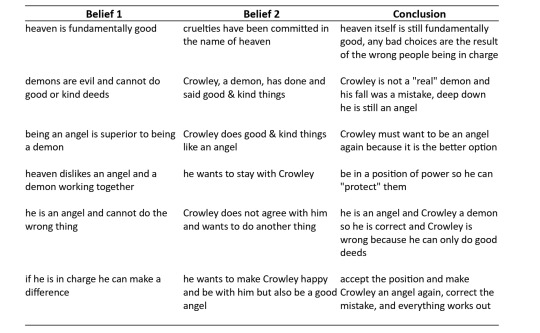
However, Aziraphale has finally reached the one boundary Crowley will never be willing to cross, not for him, not for anyone else. He will not go back to heaven and he sure as fuck has zero desire to be an angel again. Aziraphale could pull out whatever manipulation tactics he wants (and he does) but Crowley will not change his minds and is rightfully upset that Aziraphale is asking that of him.
So where does that leave us?
Belief 1: Returning to heaven and taking that position means he will be in charge and can change heaven so it is 100% good the way it is supposed to be. It's the right thing to do as a Good Angel.
Belief 2/Reality: He knows heaven is cruel. He knows there was a revolution with thousands of angels trying to change heaven and they failed. He knows that demons are not inherently evil and that angels are not inherently good. He knows that Crowley wants to save the world, that he makes choices are are kind, that he saves people, that he cares—and he won't go back to heaven. He knows he does not want to be without Crowley.
If the Metatron had given them the time to properly, actually talk about it, I think Aziraphale would have come to the conclusion that Crowley is right about heaven and has been all along—but the Metatron was purposefully hurrying him along and so they didn't.
When Aziraphale panics like he did then, he (like many other people) stick with the belief(s) that feels safest, the one that is instinctual, the one that requires the least amount of thinking. For Aziraphale, that is do as heaven tells you, so that is what he argues for. He gets stuck in that corner and when Crowley rightfully sets boundaries, he panics even more because that hasn't happened before, Crowley always relented in the end.
So he panics more and more and more, says increasingly hurtful things and becomes more manipulative, which in turn makes Crowley more upset, and they spiral until Crowley reaches his breaking points and accepts that he is choosing heaven over him.
Again.
By the time we reach the "you don't understand what I'm offering you", Aziraphale is out of arguments. I mean, what's he going to say? No, you the demon who fell for trying to change heaven don't know better than me, the angel who never faced any punishment from heaven whatsoever?
He pushed his angelic superiority as far as it will go and resorts to what he always resorts to once he is out of arguments.
Rejection. Silent treatment. I will never talk to you again, we're not friends, it's over, you're at liberty to go, if you won't you won't, then there is nothing more to say.
The Metatron has planned the entire encounter very carefully, he intentionally does not give him time to think, urges him to talk to Crowley immediately, enters the bookshop immediately after Crowley leaves, keeps walking when Aziraphale tries to change his mind, enters the lift first with his hand above the button.
Don't allow him to think so he will do as he is told, and it works unsurprisingly well.
I hope that helped clear that up, he is definitely very. convoluted in his decision making at times.
#alex answers asks#alex talks good omens#good omens#crowley#aziraphale#good omens season 2#go2#aziracrow#crowley x aziraphale#ineffable husbands#ineffable wives#ineffable spouses#ineffable divorce#the final fifteen#alex's unhinged meta corner#good omens meta#good omens thoughts
64 notes
·
View notes
Text
yes, yes, i know we’ve talked about this a literal million times but i just can’t get over the 1789 fight scene
dream sitting there all self-satisfied and unperturbed, like a spoiled prince with a bodyguard, not lifting a finger while hob fights everyone for him; until hob is personally threatened
just the supreme lack of concern about the proceedings while you know inside he’s positively preening about it, because when was the last time someone actually defended him like this? and so eagerly, so willingly?
and hob, i think that he was feeling shame about their conversation earlier and wanted to some degree to prove that he was still at the very least useful to his stranger—like, even if he finds hob utterly morally repugnant he can’t argue that hob’s not good to have around, that he didn’t throw himself willingly and eagerly into the fray when dream was threatened
hob taking out dream’s attacker first really hits on that to me. and the way hob grins at johanna when she puts the knife in his face, all “go ahead, try and fuck me up, i dare you” because he knows his stranger is watching and what’s a little pain and suffering if it means he can prove himself?
the way he tells dream that he defended him because he “didn’t want to be drinking alone here in a hundred years’ time”... but what he’s really saying is at the end of the day, it wasn’t so much dream’s physical safety he’d worried about (he had to have seen how unbothered dream was before the fight started)
it was that he’d realized he’d done something so reprehensible, so unforgivable this time with his immortality that he legitimately thought if he didn’t prove he had worth in some other way (the way hob can always fall back on, what he is at his core, bandit, soldier, fighter) his stranger would leave that night and never come back again
and inside dream might have been contemplating his dismay at the fact that hob has really reached the dregs of humanity four hundred years in, and loathing the direction hob has taken. yet here hob is throwing himself blatantly, carelessly, in the face of danger for dream and it’s not exactly atonement but it’s something. it’s something that appeals to that little subconscious part of dream he won’t acknowledge, that desire to be loved and to feel a sense of safety, to sense others’ loyalty to him
the way dream looks at hob after, the undisguised heat of it but also the pettiness, the way dream pretends at not having wanted to be defended. the “yes, it seems you are good for something, after all” undertone of it, the way they’re both looking at each other like, yes, we can at least take shelter in physicality
the way their morality is so fundamentally opposed in this scene, but they’re still so bonded by the common factor of their otherness and how that otherness puts them both in danger—that they come right back around on the other side of contention to understanding, to desire because they both hunger to be seen, each in their own way
aughhhh i am distraught
502 notes
·
View notes
Text
I’ve Never Done This Before But…
This is a little something I wrote up over the course of one night.. I don’t think it’s good enough for ao3, nor can I think of a title or summary to post it there but I also don’t want to scrap it so here it is🥰
I’d been talking to a friend about the overall thematic questions of different works of fiction, and here’s what it resulted it.
The overall question here is: can someone change while keeping the fundamental themness of themselves.
The answer, by Izzy Hands.
Relationships: Stede Bonnet/Israel Hands
Rating: Teens and Up
*~*~*~*~*
"Alright everyone!" Stede smiles as he looks over the loot they've acquired from their most recent raid. "Let's get this all packed up before sunset." There are a few grumbles but after a stern look from Izzy, the crew begins working. Stede pauses to give him a grateful look and he rolls his eyes but nods, a small smile pulling at his lips.
He begins to make his way across the deck, wincing at the pain in his stump before realizing his error. Stede's grateful look has morphed into one of concern and Izzy feels an instinctual rush of embarrassment at having let his guard down in front of him.
"Izzy, my quarters, if you please." The smile Stede gives him is so tender it could almost kill him. He huffs, following behind the captain, the crew's eyes on them. He's used to it, now. It's been nearly a month since the Revenge left the Republic of Pirates, left Edward manning Jeff’s Inn by the Sea with a small team of equally bored and restless ex-pirates, and the crew had to come to terms with the fact that Izzy wasn't going anywhere.
At first they had been suspicious, sure that Izzy would do something to betray Stede again, to turn him in for his bounty. It hadn't taken long, though, for Izzy to prove his loyalty and the crew, while wary, accepted him. It helped that his relationship with Stede had changed.
"So, what is this about?" Izzy asks, his tone impatient, though he already knows. He had seen Stede eyeing his stump earlier during the raid and again on deck and the concern on his face had been clear.
"Israel," Stede begins, and he shivers at the sound of his own name. It's something that's been so deeply and utterly his for the majority of his life, and yet, hearing Stede say it now makes his heart race. "When was the last time you tended to your leg?"
"This morning." Izzy lies. He hates when Stede worries about him like this. Hates the guilt that floods his expression, hates the way his eyes seem to plead with him, the way he seems to think he can fix him.
"You're lying."
"It doesn't matter." Izzy insists. He turns to leave, not wanting to deal with the rest of this conversation.
"You've got to stop punishing yourself for this, Israel." Stede says, and Izzy stills. "It's been long enough, don't you think?"
"So?" He doesn't turn to face Stede. He keeps his gaze planted firmly on the wall, the floor, hoping his dignity will remain intact.
"So," Stede steps closer to him, and he can feel the warmth radiating off his body. It's so comforting, the feeling of him being close. It makes his heart ache, sometimes. "So, you deserve better."
"I don't." Izzy's voice is small, and he hates how weak he sounds. He turns to face Stede, who is wearing the same soft expression as always. His eyes are filled with sadness, his lips slightly parted, and he already wants to lean into the touch that he knows will come.
"You do." Stede reaches out, stroking his cheek with the back of his fingers. Izzy's skin burns from the touch, and his heart aches. He doesn't deserve this. He doesn't. His eyes flutter shut, unable to bear the intensity of Stede's gaze, and his hand moves, wrapping around the back of his neck and pulling him in closer. "You're so much more than what you let yourself believe, Israel." His thumb strokes his jaw, and the tears begin to fall. Stede wipes them away, and pulls him in for a kiss. Izzy melts into it, into the comfort of it, the safety he feels with Stede. After so many years of fear, it's overwhelming, and yet, it's exactly what he needs.
When they pull apart, Stede presses their foreheads together. They breathe each other in for a moment before Stede pulls away.
"Sit on the couch, if you please." Stede says simply. It's not an order. Izzy has gotten used to these half-commands, the ways that Stede gives him space, that he doesn't try to take away his agency, his sense of self. It had been a lot for him, at first. The way that Stede treated him, the way that he wanted to take care of him. It was all too foreign. And yet, Izzy had found himself wanting to be cared for, and he had let Stede. He had let him tend to his wounds, to his stump, his heart, his soul.
"Okay." He whispers, and Stede smiles. He sits, and Stede joins him a few minutes later, carrying a bowl of warm water, a clean cloth, and a new bandage. He sits on the floor in front of him, taking his peg off and setting it aside.
The wound healed a long time ago, but Izzy can't stand the sight of it, can't stand the phantom pain that courses through him, the guilt and self-hatred that floods him. He tries to hide it, but the way that his breath catches in his throat, the way he clenches his jaw, the way his hands ball into fists at his side, the way he stares at the floor, Stede notices. He's noticed all of it, and Izzy hates it, but he loves it, too.
He hates that he's so vulnerable, so weak, but he loves the care, the compassion, the affection, the softness, the kindness. He doesn't know how he's ever lived without it, and the thought of living without it now is enough to drive him mad.
"You don't have to do this." Izzy reminds him as he always does, his voice hoarse. "I can do it myself."
"I want to, though." Stede says, and Izzy doesn't protest further. He watches as Stede begins cleaning the area, his touch feather light, his eyes full of focus and determination. He tries not to cry, tries not to let the tears fall. He's not used to being cared for, and while part of him feels like he doesn't deserve it, another part of him craves it.
Stede is patient, and meticulous. He takes his time, ensuring that every last bit of the stump is cleaned. The water has long gone cold, but neither of them pay it any mind. They are lost in each other, lost in the tenderness, the vulnerability, the love. When Stede finishes, he dries it and wraps it in the clean bandage with gentle hands. Once he finishes, he looks up at Izzy.
"Thank you." Izzy says, his voice thick with emotion. Stede smiles softly and leans in, kissing him. It's a soft kiss, full of love and tenderness, and Izzy melts into it.
"You're welcome." Stede says. He puts Izzy's peg back on, and stands, extending a hand out to him. "Now, how about we go check on the crew? See how the packing is going?"
"Yeah." Izzy nods. "We should."
"Great." Stede smiles, and Izzy takes his hand. He lets Stede pull him up and lead him out of the room. As they make their way across the deck, their hands linked, their shoulders brushing, their hearts full, the crew's eyes on them—working just a little harder now that Izzy is out amongst them, Izzy can't help but smile.
A lifetime ago, he had been seated in a dimly lit tavern in Saint Vincent, drinking with Anne, Mary, Jack, and Sam. They'd been celebrating Sam's thirtieth birthday and Mary and Anne’s retirement all in one.
"D'you think people can change?" Mary had asked, words slurring, eyes heavy with alcohol. She casted her gaze towards Anne who was chasing a glass of whiskey with rum, and her face softened. "D'you think we can change and have the things we like about ourselves stay the same? Like, d'you think a person can have both?"
Izzy hadn't known how to answer then. His tongue had been heavy, his thoughts weighed down by liquor, and he had merely shrugged, his heart sinking.
He knows the answer now. He can feel it in the way that his heart has grown lighter, the way his shoulders no longer carry the burden of his past, the way his skin no longer prickles at the slightest provocation, the way his smile comes easier. He can feel it in the way the sun seems brighter, the way the world seems a little kinder, the way the days go by just a bit easier.
Yes, Izzy thinks, slaying British Navy men while offering encouraging smiles to the crew he is beginning to love.
Yes, he thinks, growling halfhearted complaints as he slides into a seat he is beginning to consider his home, next to Frenchie and Jim.
Yes, he thinks, forgiving Edward for all his wrongdoings while simultaneously refusing to let his captain skip over all his boundaries. He stays ashore when he wants to, comes to visit when he wants to, is slowly but surely teaching Edward that no is a complete sentence.
Yes, he thinks, looking around the deck of the ship he now calls home, the crew he now calls family, the space that had become his refuge, his place of solace, his sanctuary.
Yes, he thinks, he has changed. But underneath, he’s still him. He’s a more loved him, a softer him, a him that’s quicker to smile, but still undeniably, him.
~*~*~*~*~
I don’t even know if people post things that are this long on this app but if you made it this far, I hope you enjoyed !!
#ao3 fanfic#fanfiction#ofmd#our flag means death#writing#izzy hands#stede bonnet#stizzy#ofmd s2#gentlehands#wip wednesday#current wip
40 notes
·
View notes
Text
thinking abt the trio (malak, exile, revan) and how they present themselves
malak, i believe, is an awkward and subservient to an almost annoying degree. he follows revan around, does what revan says. he’s not a charismatic leader and he lacks many skills that could turn him into a good leader. he’s quick to anger and lacks emotional discipline, which only worsens as his life entwines with the sith. really the only thing that keeps malak’s emotions in check (and snarky remarks) is revan. malak also has a lot of complicated feelings towards revan. eventually i believe that revan’s dismissal of him and what he believes he can offer in terms of command and leadership is what drives him over the edge (and all that sith stuff). after revan’s supposed death and malak assuming the position of leader in the sith— he becomes a bully. once he was quiet, did revan’s bidding, now he’s angry. i also believe that, quite frankly, he never shuts up. he talks back to people, rudely, and isn’t afraid of what will happen if he demands things. he’s no longer in revan’s shadow and he knows it.
the exile is not a chatty person. she makes polite conversation but she’s not overbearing. the exile is nice, goes out of her way to include people in things. she’s charmingly awkward. she’s fit for leadership, but it’s not a role that comes easily to her. the exile manipulates others to reach this goal, even without her truly realizing it. she’s not a confidant person, which is why she is so drawn to revan. her self confidence is weak, especially after she cut herself off from the force. the exile bases much of her self worth off of what she can do for others— revan before malachor, and later the crew of the ebon hawk. many people describe her as a sort of ghost, she passes through rooms unnoticed, but the impact she makes on those who do notice her is tremendous. by the time kotor ii roles around the exile is tired, it’s apparent in their face and their body language. unlike malak, they did not enjoy the attention brought by the war. there is also something to be said by her presence in the force. it’s a hole that eats away at its surroundings, something you would not expect from such an unassuming person. non force users see her as a quiet, nice but awkward woman, force users see her as a threat lurking beneath the waters of a murky lake.
the exile was a good leader but nothing like revan. revan is a confident and charismatic person who would stop at nothing to get what they deemed was needed. i believe they are a fundamentally good person, who easily gets caught up in the mindset of “means to an end”. they’re if nothing but determined. the exile and malak suffer from their inability to stand their ground, be what they need to be, revan is not that. they take what they need to get what they want. before the war many jedi would describe them as contemplative, always yearning for more knowledge. it’s not until the threat of the mandalorians emerge that they prove their leadership skills…but revan was off putting to an odd degree, and had always been. it’s as if you could see their fate etched onto them, and they knew it. they always knew. revan has an aura of understanding, knowing what is needed at all times. this was only exacerbated as the war was drawn on. their troops would describe them as a wonderful leader, good with their fellow soldiers, always knew what to say. but those in high command, or better yet malak, would not say that. they were short and shut down conversations or suggestions that did not fit with what they thought was right…after the war that same feeling was present. even if revan did not know who or what they were, they still knew they needed to get what was needed done. most likely they were more friendly and charismatic when they were amnesiactic. always knowing what to say or do. they were still an odd fellow, their demeanor switching from excitable and friendly to quiet and contemplative. and when i mean contemplative i don’t mean your average socrates, but in a way that makes a ripple through the force…
food for thought idk
#sorry guys i’m insane abt these games#also if this isn’t consistent i’m sorry…it’s 12:30am and it could probably use some more refining#star wars#kotor#knights of the old republic#kotor ii#kotor 2#revan#darth revan#malak#darth malak#the exile#meetra surik
25 notes
·
View notes